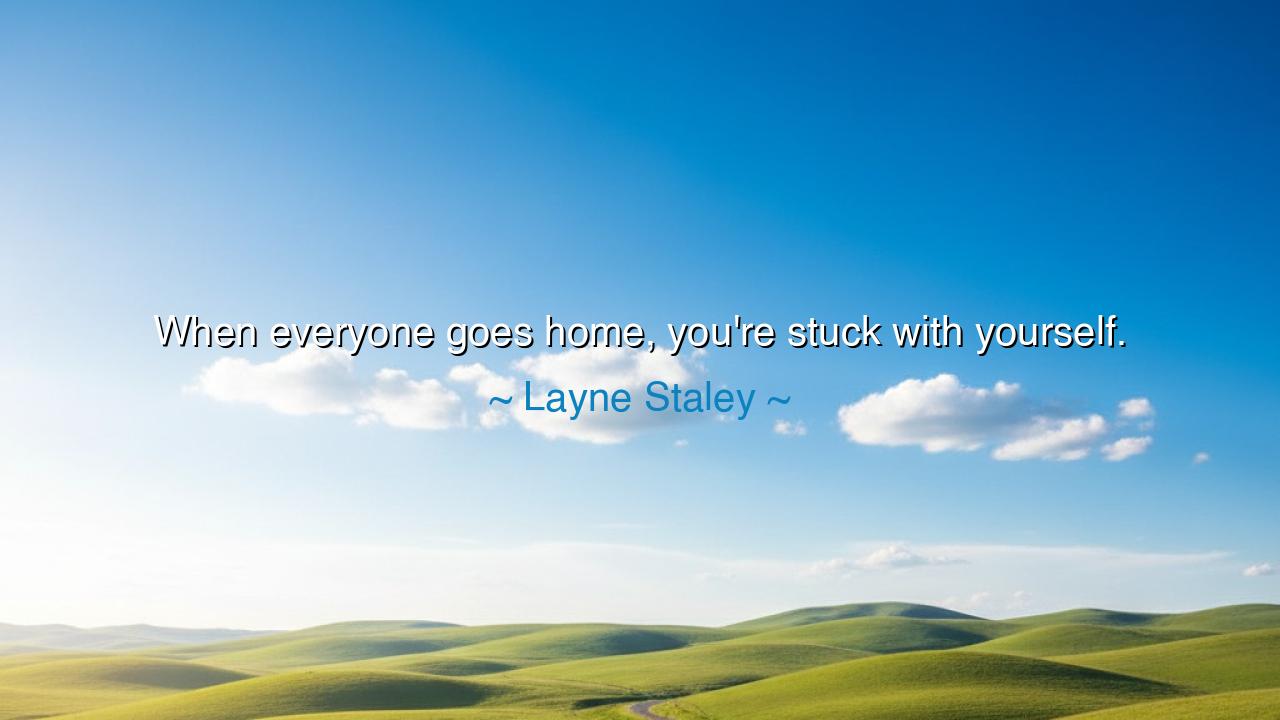
When everyone goes home, you're stuck with yourself.






“When everyone goes home, you’re stuck with yourself.” Thus spoke Layne Staley, the haunted voice of a generation, whose music carried both the ache of truth and the beauty of brokenness. In these few words, he revealed a wisdom carved from solitude and suffering: that when all the noise fades and the world turns away, a person must face the only companion who never leaves—their own self. It is a warning and a revelation alike, for no one can escape the truth of what they are when silence descends and company is gone.
The origin of this quote lies in Staley’s later years, when fame and addiction had stripped away illusion. As the frontman of Alice in Chains, he had known the roar of the crowd, the blinding lights, the fleeting adoration that fools a man into believing he is invincible. But when the music stopped, and the stage went dark, he found himself alone—with his thoughts, his fears, his regrets. What he discovered in that silence was not the glamour of celebrity, but the burden of self. It was then that he uttered these words, as if speaking from the edge of both life and understanding: “When everyone goes home, you’re stuck with yourself.”
To be “stuck with yourself” is to stand naked before your own spirit—without distraction, without applause, without the masks that society allows. It is in such moments that one learns who they truly are. The wise of every age have known this truth. Socrates, the philosopher of Athens, declared that the unexamined life is not worth living. Buddha, sitting beneath the Bodhi tree, found enlightenment not in the company of others, but in the stillness of solitary reflection. And so too did Layne Staley, through pain rather than peace, uncover this ancient principle: that peace with the self is the foundation of all strength, while estrangement from the self is the seed of despair.
There is a tale from the East of a warrior who, after countless battles, returned home to find no joy in victory. His lands were vast, his name renowned, yet his heart was hollow. Seeking counsel, he visited a hermit in the mountains and asked how to find peace. The hermit gave him no speech, only a mirror, and said, “When all others leave you, this is who remains. Make him your friend, or all your triumphs will turn to ashes.” The warrior understood then what Layne Staley would one day put into modern words: that no conquest, no fame, no wealth can spare one from the reckoning that comes in solitude.
Staley’s quote is also a mirror held to our own age—a time of endless noise and constant connection, where few dare to sit in silence. We fill every moment with sound, screens, and chatter, fleeing the stillness that would reveal what lies beneath. Yet his words cut through this illusion. They remind us that no matter how many people surround us, or how much we possess, the truest test of peace is found alone, in the quiet of one’s own heart. When the world withdraws and the night falls, it is not others we must face, but the truth of ourselves.
But Staley’s words are not born only of sorrow—they carry the seed of redemption. For if one is “stuck” with oneself, then it follows that one can also heal oneself. The loneliness he speaks of is also an invitation to reconciliation. To sit with oneself without fear, to forgive one’s past, to nurture the spirit within—this is the work of liberation. Those who make peace with their solitude discover a power that cannot be shaken by the loss of others, for they have built their home within.
The lesson, then, is clear: do not fear being alone. Learn instead to dwell with yourself in honesty and compassion. Spend time in reflection; know your flaws and your strengths as a friend would. Create beauty in solitude, as Layne Staley created music from pain. Let silence be your teacher, not your tormentor. For when all others depart—and they will—it is your own heart that remains, and the peace or pain it holds will be the measure of your life.
So, O seeker, remember the wisdom of Layne Staley: the applause fades, the world grows quiet, and all companions eventually depart—but the self abides. Do not run from that encounter. Sit with it. Know it. Heal it. For the one who makes peace with himself will never truly be alone, and when everyone goes home, he will find not a prison—but a sanctuary.






AAdministratorAdministrator
Welcome, honored guests. Please leave a comment, we will respond soon